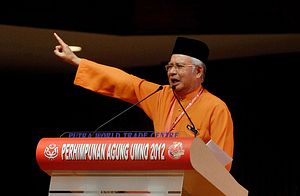On Thursday, Malaysia announced that it had instituted a travel ban on citizens to North Korea in the wake of escalating tensions. Though the move, which was far from surprising, immediately led to a flood of headlines, it needs to be understood within the broader context of Malaysia’s ties with North Korea and ongoing developments affecting both sides.
As I have noted before, though international attention on Malaysia’s relationship with North Korea have tended to focus on discrete events, with a recent case in point being the diplomatic row that resulted following the death of Kim Jong-un’s estranged half-brother Kim Jong-nam, the so-called “special relationship” between the two sides has often been poorly understood (See: “The Myth of a Malaysia-North Korea Special Relationship”).
Even before the row erupted this year, though Malaysia had continued ongoing efforts to expand ties in specific fields like economics, culture, and education, that had not prevented it from also condemning North Korean missile tests or supporting UN resolutions sanctioning Pyongyang. For Malaysian policymakers, there is a fine line to walk between cultivating ties with Pyongyang but also preserving good ties with key countries like South Korea, Japan, and the United States; upholding its commitment to regional and international institutions like ASEAN and the UN; and being mindful of its record on nonproliferation which Malaysia has begun to get more serious about.
North Korea’s battery of missile tests and the resulting international scrutiny under Kim Jong-un over the past few years had also no doubt already led to greater attention to Malaysia’s (and, to be clear, other Southeast Asian states’ too) links with Pyongyang and led policymakers to consider undertaking some tougher measures, particularly in coming to full compliance with United Nations Security Council (UNSC) resolution 2270 in March 2016.
That said, Kim Jong-nam’s death and the diplomatic row that resulted has led Malaysia to enact some tougher measures against North Korea, only some of them publicized and at times much later than they were actually implemented. For instance, in late June, reports surfaced that Malaysia had sent back existing North Korean workers and ceased to issue work permits for new ones as well, though the move had effectively begun implementation months earlier.
This comes as U.S. President Donald Trump’s administration has also been urging Southeast Asian states like Malaysia to cease links with Pyongyang (See: “What Was the First US-ASEAN Special Meeting Under Trump Really About”) through a variety of measures, despite the divergence in perception clearly evident in some cases. As I pointed out earlier, this was a subject of discussion in bilateral ties during Malaysian Prime Minister Najib Razak’s visit to Washington, D.C. earlier this month for his White House meeting with Trump (See: “The Real Test for US-Malaysia Relations in the Trump Era”), though Trump’s statement praising Malaysia for ceasing to do all business with North Korea, officials say privately, belied a more complex reality.
Malaysia’s travel ban represents just the latest move undertaken by the Southeast Asian state with respect to the escalating North Korea situation. And seen from that broader perspective, it is far from surprising, given the restrictions already enacted in several realms, including on workers, select businesses, flights, and even postponement of a soccer match, as well as rising concerns about the security of Malaysian citizens evident in the diplomatic row that erupted earlier this year.
The ban on citizens from traveling to North Korea until further notice, announced by the foreign ministry (Wismaputra), was unsurprisingly publicized by Malaysian authorities within the wider context of escalating tensions on the Korean Peninsula rather than as a product of just bilateral ties alone. Wismaputra also said that the travel ban would be reviewed once the situation is judged to have returned to normal, leaving some room for flexibility.
With the North Korean situation seeming to get worse by the day instead of better though, it is far more likely that we will see more restrictions of this ilk – and tougher enforcement of existing ones too – rather than a loosening of them, not just from Malaysia, but from some other states that have remaining links with Pyongyang as well.

































